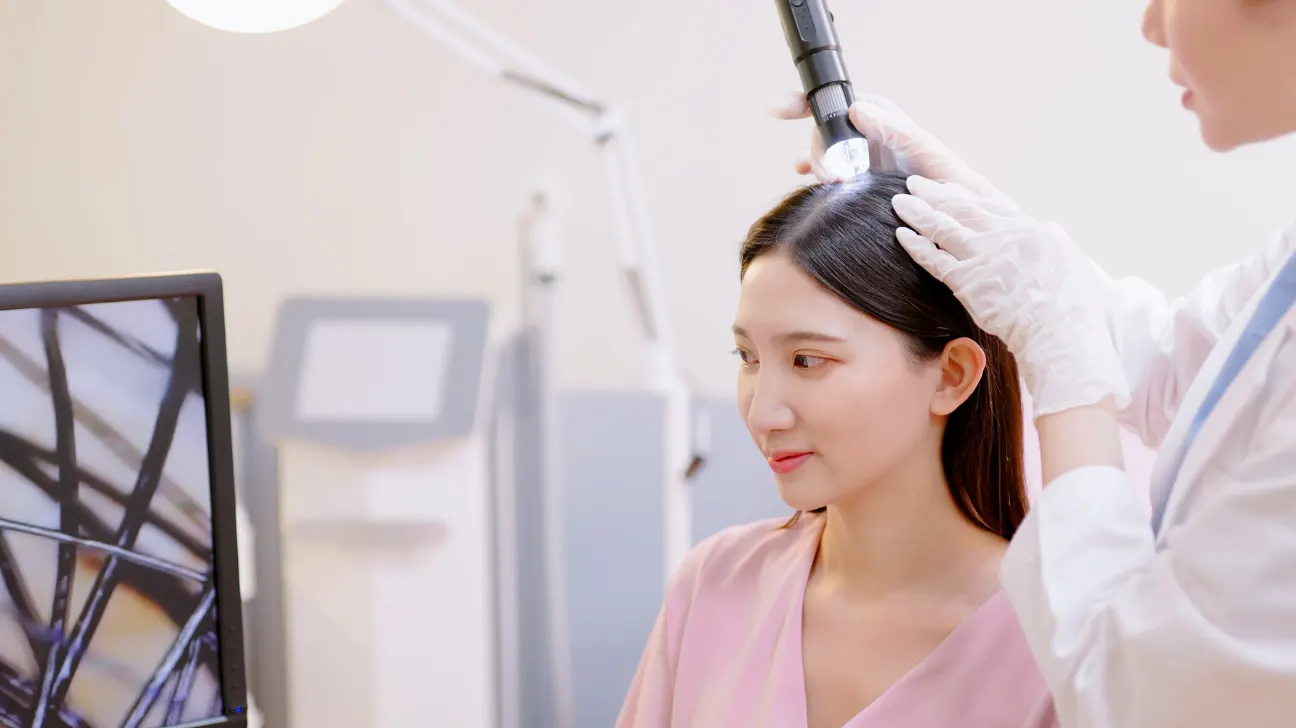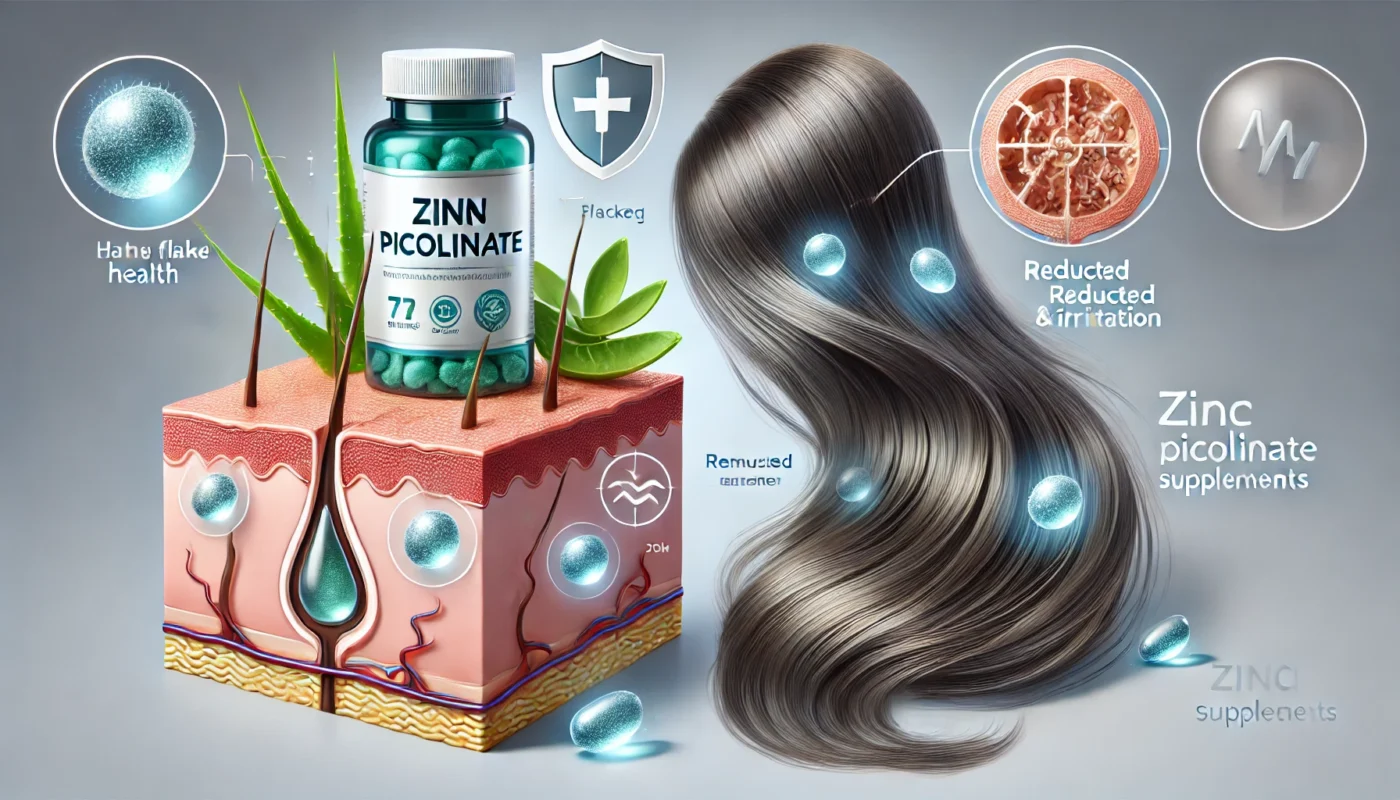Maintaining scalp health is essential for overall hair wellness, yet issues like dandruff, dryness, and irritation affect millions of people worldwide. While these problems are often attributed to external factors like hair products or environmental conditions, they are frequently rooted in underlying skin imbalances, microbial overgrowth, or nutritional deficiencies.
One mineral, zinc, has gained recognition for its ability to promote scalp health by regulating oil production, controlling microbial activity, and reducing inflammation. Zinc picolinate, a highly bioavailable form of zinc, enhances the body’s ability to absorb and utilize this essential mineral, offering significant benefits for scalp health. This article explores how zinc picolinate helps alleviate dandruff, soothe irritation, and restore balance to the scalp.
You May Also Like:
Zinc Picolinate for Postpartum Hair Loss Recovery: Do You Need It?
Zinc Picolinate for Better Hair During Pregnancy: A Natural Approach
Zinc Picolinate for Scalp Health: Reducing Flakes and Irritation is an original (HSLHealing) article.
Understanding Dandruff and Scalp Irritation
Dandruff, or seborrheic dermatitis, is a common scalp condition characterized by flaky skin, redness, and itching. It is primarily caused by the overgrowth of Malassezia yeast, a microorganism naturally present on the scalp. Factors that contribute to dandruff and scalp irritation include:
- Excess Oil Production:
Overactive sebaceous glands create an environment conducive to Malassezia overgrowth. - Inflammation:
The immune system’s response to Malassezia can trigger redness, itching, and irritation. - Skin Barrier Dysfunction:
A compromised scalp barrier leads to dryness and flaking. - Nutritional Deficiencies:
A lack of essential nutrients like zinc can exacerbate scalp issues by impairing skin repair and immune responses.
The Role of Zinc in Scalp Health
Zinc is a vital nutrient for maintaining scalp health due to its antimicrobial, anti-inflammatory, and sebum-regulating properties. Key roles include:
- Inhibiting Malassezia Growth:
Zinc has antifungal properties that control Malassezia overgrowth, reducing flakes and irritation. - Regulating Sebum Production:
Zinc balances oil production, preventing the excessive buildup that fuels dandruff. - Supporting Skin Barrier Function:
Zinc promotes the repair and maintenance of the scalp’s protective barrier, reducing dryness and flaking. - Reducing Inflammation:
Zinc modulates inflammatory pathways, alleviating redness and itching. - Enhancing Antioxidant Defenses:
Zinc protects scalp cells from oxidative stress, which can worsen irritation and damage.
Support a healthy scalp with Zinc Picolinate—Reduce Flakes and Irritation, Shop Now on Amazon!

What Is Zinc Picolinate?
Zinc picolinate is a chelated form of zinc, where zinc is bound to picolinic acid. This structure enhances zinc absorption in the gastrointestinal tract, making it one of the most bioavailable forms of zinc supplementation. For individuals experiencing dandruff or scalp irritation, zinc picolinate ensures efficient delivery of zinc to the tissues where it is needed most.
How Zinc Picolinate Supports Scalp Health
1. Controlling Malassezia Yeast
The overgrowth of Malassezia yeast is a primary driver of dandruff. Zinc picolinate’s antifungal properties inhibit the proliferation of this microorganism, reducing flakes and irritation.
- Study Insight: Research in Journal of Dermatological Science found that zinc supplementation reduced Malassezia levels by 30%, alleviating dandruff symptoms in patients with seborrheic dermatitis.
2. Regulating Sebum Production
Excess oil production contributes to clogged hair follicles and creates an ideal environment for Malassezia. Zinc picolinate balances sebum production, promoting a healthier scalp.
- Clinical Evidence: A study in Journal of Investigative Dermatology showed that zinc reduced sebum production by 20%, improving scalp conditions linked to oil buildup.
3. Reducing Inflammation
Scalp inflammation exacerbates dandruff symptoms, leading to redness, itching, and discomfort. Zinc picolinate modulates inflammatory cytokines, soothing the scalp and promoting comfort.
- Research Finding: A study in Nutrients reported that zinc supplementation decreased levels of inflammatory markers like interleukin-6 (IL-6) by 25%, reducing redness and irritation in individuals with scalp dermatitis.
4. Enhancing Skin Barrier Function
A compromised scalp barrier allows moisture loss and irritants to penetrate the skin, worsening dandruff. Zinc picolinate supports the production of proteins and lipids that strengthen the scalp barrier.
- Evidence: Research in Skin Pharmacology and Physiology demonstrated that zinc improved scalp hydration by 18%, reducing dryness and flaking.
5. Supporting Cellular Repair and Turnover
Healthy scalp skin relies on efficient cell turnover to shed dead cells and regenerate new ones. Zinc picolinate promotes these processes, preventing the accumulation of dead skin that leads to flakes.
- Study Insight: A clinical trial in International Journal of Trichology found that zinc supplementation accelerated skin repair by 22%, enhancing scalp renewal.
Zinc Deficiency and Scalp Health
Zinc deficiency can significantly impair scalp health, contributing to issues like dandruff, dryness, and irritation. Symptoms of zinc deficiency include:
- Excessive Flaking:
Impaired cell turnover leads to the accumulation of dead skin on the scalp. - Prolonged Inflammation:
A lack of zinc exacerbates inflammatory responses, worsening irritation. - Compromised Skin Barrier:
Zinc deficiency weakens the scalp’s protective barrier, increasing susceptibility to dryness and infections.
Statistics:
- A study in The Lancet found that 20% of individuals with chronic dandruff also exhibited zinc deficiency, underscoring the mineral’s role in scalp health.

Dietary Sources of Zinc
While zinc picolinate supplementation is highly effective, incorporating zinc-rich foods into the diet can also support scalp health. Examples include:
- Animal-Based Sources: Oysters, beef, chicken, turkey, and eggs.
- Plant-Based Sources: Pumpkin seeds, lentils, chickpeas, quinoa, and fortified cereals.
For individuals with dietary restrictions or absorption issues, zinc picolinate provides a reliable and efficient alternative.
Recommended Dosage and Safety
The recommended dietary allowance (RDA) for zinc is:
- Men: 11 mg/day
- Women: 8 mg/day
For scalp health, therapeutic doses of zinc picolinate typically range from 15–30 mg/day. Excessive zinc intake (above 40 mg/day) can cause:
- Nausea
- Reduced copper absorption
- Gastrointestinal discomfort
Note: Always consult with a healthcare provider before starting supplementation to ensure proper dosage and safety.

Integrating Zinc Picolinate into a Scalp Care Routine
- Combine with Topical Treatments: Zinc picolinate works well alongside shampoos containing zinc pyrithione, a topical zinc compound that reduces dandruff.
- Maintain a Balanced Diet: Include zinc-rich foods to complement supplementation.
- Stay Hydrated: Proper hydration supports scalp health and reduces dryness.
- Monitor Progress: Track improvements in flaking, redness, and irritation after starting supplementation.
Who Can Benefit from Zinc Picolinate for Scalp Health?
- Individuals with Chronic Dandruff: Zinc picolinate addresses the root causes of flakes and irritation.
- People with Oily Scalps: Zinc regulates sebum production, preventing excess oil buildup.
- Those with Sensitive Scalps: Zinc’s anti-inflammatory properties soothe irritation and redness.
- Individuals with Zinc Deficiency: Zinc picolinate replenishes zinc levels, supporting overall skin and scalp health.
Future Research Directions
While current studies highlight zinc picolinate’s benefits, further research could explore:
- Its long-term effects on chronic scalp conditions like seborrheic dermatitis.
- Synergistic benefits with other nutrients, such as biotin and omega-3 fatty acids.
- Zinc’s role in promoting hair growth alongside improving scalp health.
Conclusion: Zinc Picolinate for Flake-Free, Healthy Scalp
Zinc picolinate offers a powerful, evidence-based solution for addressing dandruff, irritation, and other scalp issues. By controlling Malassezia growth, reducing inflammation, and supporting scalp barrier function, it provides comprehensive benefits for maintaining a healthy scalp environment.
For individuals seeking to improve scalp health and reduce dandruff naturally, incorporating zinc picolinate into their routine provides a safe and effective option. As always, consult with a healthcare provider to tailor supplementation to your specific needs and ensure optimal results.

References
- Innovative uses for zinc in dermatology. Retrieved from: https://pubmed.ncbi.nlm.nih.gov/20510767/
- Zinc penetration through the skin barrier in atopic dermatitis and rosacea using reflectance confocal microscopy. Retrieved from: https://pubmed.ncbi.nlm.nih.gov/37909707/
- Kilic, M., et al. (2016). Serum Zinc Concentration in Patients with Alopecia Areata. Free Radical Biology and Medicine.Retrieved from: https://pmc.ncbi.nlm.nih.gov/articles/PMC10561101/
- Lukaski, H. C. (2018). Analysis of Serum Zinc and Copper Concentrations in Hair Loss. Dermatology Research and Practice.Retrieved from: https://pmc.ncbi.nlm.nih.gov/articles/PMC3870206/
- De Baaij, J. H. F., et al. (2020). The Therapeutic Effect and the Changed Serum Zinc Level after Zinc Supplementation in Alopecia Areata Patients Who Had a Low Serum Zinc Level: Clinical Insights. International Journal of Trichology.Retrieved from: https://pmc.ncbi.nlm.nih.gov/articles/PMC2861201/
Important Note: The information contained in this article is for general informational purposes only, and should not be construed as health or medical advice, nor is it intended to diagnose, prevent, treat, or cure any disease or health condition. Before embarking on any diet, fitness regimen, or program of nutritional supplementation, it is advisable to consult your healthcare professional in order to determine its safety and probable efficacy in terms of your individual state of health.
Regarding Nutritional Supplements Or Other Non-Prescription Health Products: If any nutritional supplements or other non-prescription health products are mentioned in the foregoing article, any claims or statements made about them have not been evaluated by the U.S. Food and Drug Administration, and such nutritional supplements or other health products are not intended to diagnose, treat, cure, or prevent any disease.

